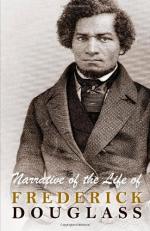|
This section contains 5,449 words (approx. 19 pages at 300 words per page) |

|
SOURCE: "Revolution and Reform: Walker, Douglass, and the Road to Freedom," in Long Black Song: Essays in Black American Literature and Culture, 1972. Reprint by The University Press of Virginia, 1990, pp. 58-83.
In the following excerpt, Baker analyzes the literary techniques of Douglass's Narrative by contrasting it, in terms of style and tone, with David Walker's Appeal.
During the first half of the nineteenth century, two monuments of the black literary tradition had their birth. One was David Walker's Appeal, written in 1829, and the other was Frederick Douglass's Narrative of the Life of Frederick Douglass, an American Slave, Written by Himself, which appeared in 1845. Both captured the spirit of their epoch, and both define certain modes, techniques, and conventions that since their time have played significant roles in the literary tradition of which they are a part.
The first half of the nineteenth century was one of the most...
|
This section contains 5,449 words (approx. 19 pages at 300 words per page) |

|


